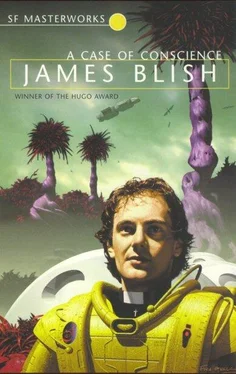He checked Cleaver’s pulse and respiration. Both were fast, even for Lithia, where a high partial pressure of carbon dioxide raised the pH of the blood of Earthmen and stimulated the breathing reflex. The priest judged, however, that Cleaver was in little danger as long as his actual oxygen utilization was not increased. At the moment he was certainly sleeping deeply—if not very restfully—and it would do no harm to leave him alone for a little while.
Of course, if a wild allosaur blundered into the city… But that was just about as likely as the blundering of an untended elephant into the heart of New Delhi. It could happen, but it almost never did. And no other dangerous Lithian animal could break into the house if it was closed. Even the rats—of the abundant monotreme creatures which were Lithia’s equivalent—found it impossible to infest a pottery house.
Ruiz-Sanchez changed the carafe of fresh water in the niche beside the hammock, went into the hall, and donned boots, mackintosh and waterproof hat. The night sounds of Lithia burst in upon him as he opened the stone door, along with a gust of sea air bearing the characteristic halogen odor always called “salty.” There was a thin drizzle falling, making halos around the lights of Xoredeshch Sfath. Far out, on the water, another light moved. That was probably the coastal side-wheeler to Yllith, the enormous island which stood a-thwart the Upper Bay, barring the Gulf of Sfath as a whole from the equatorial sea.
Outside, Ruiz-Sanchez turned the wheel which extended bolts on every margin of the door. Drawing from his mackintosh a piece of soft chalk, he marked on the sheltered tablet designed for such uses the Lithian symbols which meant “Illness is here.” That would be sufficient. Anybody who chose to could open the door simply by turning the wheel-the Lithians had never heard of locks-but the Lithians, too, were overridingly social beings, who respected their own conventions as they respected natural law.
That done, Ruiz-Sanchez set out for the center of the city and the Message Tree. The asphalt streets shone in the yellow lights cast from windows, and in the white light of the mantled, wide-spaced street lanterns. Occasionally he passed the twelve-foot, kangaroo-like shape of a Lithian, and the two exchanged glances of frank curiosity, but there were not many Lithians abroad now. They kept to their houses at night, doing Ruiz-Sanchez knew not what. He could see them frequently, alone or by twos or threes, moving behind the oval windows of the houses he passed. Sometimes they seemed to be talking.
What about?
It was a nice question. The Lithians had no crime, no newspapers, no house-to-house communications systems, no arts that could be differentiated clearly from their crafts, no political parties, no public amusements, no nations, no games, no religions, no sports, no cults, no celebrations. Surely they didn’t spend every waking minute of their lives exchanging knowledge, making things go, discussing philosophy or history, or planning for tomorrow! Or did they? Perhaps, Ruiz-Sanchez thought suddenly, they simply went inert once they were inside their jugs, like so many pickles! But even as the thought came, the priest passed another house, and saw their silhouettes moving to and fro…
A puff of wind scattered cool droplets in his face. Automatically, he quickened his step. If the night were to turn out to be especially windy, there would doubtless be many voices coming and going in the Message Tree. It loomed ahead of him now, a sequoialike giant, standing at the mouth of the valley of the River Sfath-the valley which led in great serpentine folds into the heart of the continent, where Gleshchtehk Sfath, or Blood Lake in English, poured out its massive torrents.
As the winds came and went along the valley, the tree nodded and swayed-only a little, but that little was enough. With every movement, the tree’s root system, which underlay the entire city, tugged and distorted the buried crystalline cliff upon which the city had been founded, as long ago in Lithian pre-history as was the founding of Rome on Earth. At every such pressure, the buried cliff responded with a vast heart-pulse of radio waves-a pulse detectable not only all over Lithia, but far out in space as well. The four Commission members had heard those pulses first on shipboard, when Alpha Arietis, Lithia’s sun, was still only a point of light ahead of them, and had looked into each other’s faces with eyes gleaming with conjecture.
The bursts, however, were sheer noise. How the Lithians modulated them to carry information-not only messages, but the amazing navigational grid, the planet-wide time-signal system, and much more—was something as remote from Ruiz-Sanchez’ understanding as affine theory, although Cleaver said it was all perfectly simple once you understood it. It had something to do with semi-conduction and solid-state physics, which (again according to Cleaver) the Lithians understood better than any Earthman.
A free-association jump which startled him momentarily reminded him of the current doyen of Earthly affine theory, a man who signed his papers “H. O. Petard,” though his real (if scarcely more likely) name was Lucien le Comte des Bois-d’Averoigne. Nor was the association as free as it appeared on the surface, Ruiz-Sanchez realized, for the count was a striking example of the now almost total alienation of modern physics from the common physical experiences of mankind. His title was not a patent of nobility, but merely a part of his name which had been maintained in his family long after the political system which had granted the patent had vanished away, a victim of the dividing up of Earth under the Shelter economy. There was more honor appertaining to the name itself than to the title, for the count had pretensions to hereditary grandeur which reached all the way back into thirteenth-century England, to the author of Lucien Wycham His Boke of Magick.
A high ecclesiastic heritage to be sure, but the latter-day Lucien, a lapsed Catholic, was a political figure, insofar as the Shelter economy sheltered any such thing: he carried the additional title of Procurator of Canarsie—a title which a moment’s examination would also show to be nonsense, but which paid a small honorarium in exemptions from weekly labor. The subdivided and deeply buried world of Earth was full of such labels, all of them pasted on top of large sums of money which had no place to go now that speculation was dead and shareholding had become the only way by which an ordinary citizen could exercise any control over the keeps in which he lived. The remaining fortune-holders had no outlet left but that of conspicuous consumption, on a scale which would have made Veblen doubt that there had ever been such a thing in the world before. Had they attempted to assert any control over the economy they would have been toppled, if not by the shareholders, then by the grim defenders of the by now indefensible Shelter cities.
Not that the count was a drone. At last reports, he had been involved in some highly esoteric tampering with the Haertel equations-that description of the space-time continuum which, by swallowing up the Lorentz-Fitzgerald contraction exactly as Einstein had swallowed Newton (that is, alive) had made interstellar flight possible. Ruiz-Sanchez did not understand a word of it, but, he reflected with amusement, it was doubtless perfectly simple once you understood it.
Almost all knowledge, after all, fell into that category. It was either perfectly simple once you understood it, or else it fell apart into fiction. As a Jesuit-even here, fifty light-years from Rome-Ruiz-Sanchez knew something about knowledge that Lucien le Comte des Bois-d’Averoigne had forgotten, and that Cleaver would never learn: that all knowledge goes through both stages, the annunciation out of noise into fact, and the disintegration back into noise again. The process involved was the making of increasingly finer distinctions. The outcome was an endless series of theoretical catastrophes.
Читать дальше











